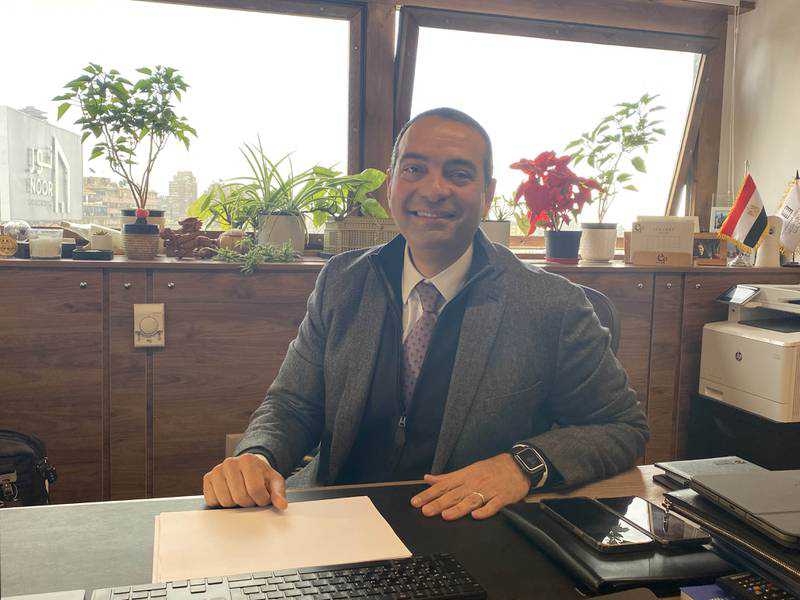Sovereign Fund of Egypt aims to double $1bn investment portfolio in 2022
25 January, 2022

The Sovereign Fund of Egypt aims to double its $1 billion investment portfolio this year with a focus on entering new sectors and championing green initiatives, its chief executive Ayman Soliman told The National.
“We are at roughly $1bn worth of assets and cash … Our aim for 2022 is to double that number,” Mr Soliman said. “That growth will be driven by in-kind cash and value creation around existing assets."
The fund, also known as TSFE, was established in 2018 to attract private investments to Egypt and promote and co-invest in state-owned assets to maximise their value.
The current breakdown of the fund is about two-thirds property, 10 per cent financial services, 10 per cent infrastructure and the remainder in the services industry.
The target in the current year and 2023 is to “dilute that heavy weight property down to a third”, Mr Soliman said. “Diluting out real estate is a conscious effort because we’re actively building the rest of the components of our portfolio.”
The fund recently added two new fields – education and food and agriculture – leaning on agriculture technology, to its four main subfunds, which include tourism, property and antiquities; health care and pharmaceuticals; infrastructure and utilities; and financial services and FinTech.
“The 2022 goal is predominantly to continue to build up our next wave of pipeline,” he said. “The next wave is going to be a lot more diverse.”
As Egypt prepares to host the UN Climate Change Conference (Cop27) in November, the fund will also focus on green initiatives, such as water desalination and renewable energy. The fund joined the One Planet Sovereign Wealth Funds Initiative in October, which includes 19 sovereign funds around the world working to incorporate sustainable investing and hedge against climate change risks.
Its six founding members are the sovereign wealth funds of Abu Dhabi, Kuwait, Qatar and Saudi Arabia, as well as those of New Zealand and Norway.
Last October, the fund signed a deal with Norwegian green energy firm Scatec and Abu Dhabi-Dutch joint venture fertiliser producer Fertiglobe to build a 50 to 100 megawatt green ammonia plant in Ain Sokhna, about 115 kilometres east of Cairo on the Red Sea. Egypt’s Orascom Construction joined the consortium in November.
By switching to renewable electricity for ammonia production, more than 360 million tonnes of carbon dioxide could be saved per year worldwide, according to Siemens Energy.
Mr Soliman said that Egypt’s first green hydrogen production facility is scheduled to be completed by November this year.
“This is just the beginning of what Egypt can achieve,” he said, calling 2022 “the green economy year”.
Egypt’s economy grew at a faster rate than expected during the 2020-2021 fiscal year that ended in June 2021, despite the Covid-19 pandemic, because of strong consumption demand, growing remittances and relatively contained inflation, according to the World Bank's global economic outlook this month.
Growth is expected to rebound to 5.5 per cent in fiscal year 2021-2022, the Washington-based lender said.
When the Egypt's sovereign fund was created in 2018, it was initially injected with 5 billion Egyptian pounds ($317.4 million) paid in capital over time. Seven government assets were transferred to the fund, including the Mogamaa Tahrir building, land of the dissolved National Democratic Party and the erstwhile Ministry of Interior building.
The fund’s board of directors is led by chairwoman Hala El Said, the Minister of Planning and Economic Development. The board appointed Mr Soliman as chief executive for a three-year term in October 2019.
In its first year, the fund focused on forging partnerships with investors and creating sector strategies. Among the partnerships was a $20bn strategic investment platform between the fund and Abu Dhabi’s holding company ADQ, launched in 2019.
In January 2020, the fund signed a preliminary agreement with UK-based emerging markets investor Actis and Egyptian construction and engineering group Hassan Allam Holding.
While the pandemic presented challenges, such as transactions taking longer and meetings taking place virtually, Mr Soliman said the fund was “not short of appetite”.
“Of course, tourism saw a massive slowdown, but a number of [other] sectors have not slowed down. Actually, they’ve become the primary focus: health care, any consumer-related business, particularly food, and infrastructure with very broad definitions,” he said.
“The fund passed a milestone in 2021, closing the year with north of 10 transactions."
In the field of education, the fund partnered with EFG Gems and Cairo for Investment and Real Estate Development to develop two schools each.
The fund also acquired a 25 per cent stake in state-owned Arab Investment Bank, while EFG Hermes purchased a 51 per cent stake and National Investment Bank retained 24 per cent, marking Egypt's first bank privatisation in more than a decade.
Last month, the fund and the planning ministry signed a contract with a consortium of three international companies to convert the administrative Mogamaa El Tahrir into a multipurpose complex.
Mr Soliman said groundbreaking will take place within the first quarter of this year and the project should be completed within two years.
TSFE is different than other sovereign wealth funds in that it is operating in a capital-strapped economy, but Egypt also has a rich asset base that can be put to good use, Mr Soliman said.
Its strategy is to create a “multiplier effect” through a co-investor model whereby “1 pound [$.06] from the fund crowds in $8-$9 from like-minded investors”, he said.
As for expansion outside Egypt, in the long term, the fund will invest regionally before globally, meaning in Africa and the Middle East.
“It’s not a matter of if, but when,” said Mr Soliman.
Source: www.thenationalnews.com
TAG(s):
